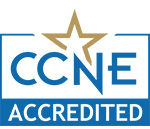Graduate and Post Baccalaureate Certificate Programs
Nurse Practitioner Graduate Certificates
The Graduate Certificate in AGACNP is designed to provide a pathway for nurses who already have a master’s or doctoral degree in nursing and want to become Adult-Gerontology Acute Care Nurse Practitioners. Post-graduate certificate programs support master’s and doctorally prepared nurses to enhance or change their career direction.
Semesters:
6 Full Time With Practicum (36 credit hours)
As part of the Master of Science in Nursing (MSN) or Graduate Certificate in Adult-Gerontology Acute Care Nurse Practitioner (AGACNP) curriculum, students will attend two on-ground immersion experiences and an on-ground intensive review session.
Courses for AGACNP Certificate:
- Population Health and Epidemiology for Advanced Nursing Practice
- Leadership and Role Development for Advanced Practice Nurses
- Advanced Pathophysiology
- Advanced Pharmacology Fundamentals
- Advanced Physical Assessment*
- Advanced Pharmacology for the Adult-Gerontology Acute Care Nurse Practitioner
- Differential Diagnosis in Acute Care Practicum
- Common Diagnosis & Management in Acute Care Practicum
- Complex Diagnosis & Management in Acute Care Practicum
- Advanced Acute Care Management
- Advanced Acute Care Management Lab**
- Acute Care Practicum I
- Acute Care Practicum II***
* As part of this course, students will attend an on-ground immersion weekend. The purpose of the immersion is to provide students with an opportunity to interact with professors and fellow students as well as to observe, participate and be evaluated on clinical assessment skills. The immersion weekend allows faculty to assess each student’s clinical competency before entering clinical rotations.
** As part of this course, students will attend a second on-ground immersion weekend. The purpose of this immersion is to provide students with the opportunity to observe, participate in and be evaluated on advanced diagnostic and therapeutic skills needed in complex acute care settings. This immersion event allows students to work with faculty and fellow students to assess skill competency before entering the final two clinical rotations.
*** As part of this course, students will attend an on-ground intensive review weekend that focuses on final student preparation for advanced practice.
The Graduate Certificate in AGPCNP is designed to provide a pathway for nurses who already have a master’s or doctoral degree in nursing and want to become Adult-Gerontology Primary Care Nurse Practitioners. Post-graduate certificate programs support master’s and doctorally prepared nurses to enhance or change their career direction.
Semesters:
5 Full Time With Practicum (33 credit hours)
As part of the Master of Science in Nursing (MSN) or Graduate Certificate in Adult-Gerontology Primary Care Nurse Practitioner (AGPCNP) curriculum, students will attend an on-ground immersion experience and an on-ground intensive review session.
Courses for AGPCNP Certificate:
- Population Health and Epidemiology for Advanced Nursing Practice
- Leadership and Role Development for Advanced Practice Nurses
- Advanced Pathophysiology
- Advanced Pharmacology Fundamentals
- Advanced Physical Assessment*
- Advanced Pharmacology for the Adult-Gerontology Primary Care Nurse Practitioner
- Differential Diagnosis in Adult-Gerontology Primary Care
- Primary Care Management of Adolescents & Adults
- Primary Care Management of Older Adults
- Palliative Care in Adult-Gerontology Across the Spectrum
- Adult-Gerontology Primary Care Capstone & Intensive**
* As part of this course, students will attend an on-ground immersion weekend. The purpose of the immersion is to provide students with an opportunity to interact with professors and fellow students as well as to observe, participate and be evaluated on clinical assessment skills. The immersion weekend allows faculty to assess each student’s clinical competency before entering clinical rotations.
** As part of this course, students will attend an on-ground intensive review weekend that focuses on final student preparation for advanced practice
The Graduate Certificate in FNP is designed to provide a pathway for nurses who already have a master’s or doctoral degree in nursing and want to become Family Nurse Practitioners. The FNP certificate offers the same FNP specialty courses, content, instruction and assessment to help prepare students to care for families in a primary care setting and sit for national certification as a Family Nurse Practitioner (FNP).
Semesters:
5 fulltime with practicum (33 credit hours)
25 hours of faculty-supervised laboratory work and 625 hours of clinical practicum work.
As part of the Master of Science in Nursing (MSN) or Graduate Certificate in Family Nurse Practitioner (FNP) curriculum, you’ll attend an on-ground immersion experience and an on-ground intensive review session.
Courses for Family Nurse Practitioner (FNP) Certificate:
- Population Health and Epidemiology for Advanced Nursing Practice
- Advanced Pathophysiology
- Advanced Pharmacology Fundamentals
- Advanced Pharmacology for Primary Care Family
- Advanced Physical Assessment
- Leadership and Role Development for Advanced Practice Nurses
- Differential Diagnosis & Primary Care
- Primary Care of the Maturing & Aged Family
- Primary Care of the Childbearing & Childrearing Family
- Advanced Clinical Diagnosis & Practice Across the Lifespan
- FNP Capstone Practicum and Intensive
****NR565 is not required in the state of Oregon for the GC-FNP program at this time*****
The Graduate Certificate in PMHNP is designed to provide a pathway for nurses who already have a master’s or doctoral degree in nursing and want to become Psychiatric-Mental Health Nurse Practitioners. Post-graduate certificate programs support master’s and doctorally prepared nurses to enhance or change their career direction.
Semesters:
5 Full Time With Practicum (35 credit hours)
As part of the Master of Science in Nursing (MSN) or Graduate Certificate in Psychiatric-Mental Health Nurse Practitioner (PMHNP) curriculum, students will attend an on-ground immersion experience and an on-ground intensive review session.
Courses for Psychiatric-Mental Health Nurse Practitioner Certificate:
- Population Health and Epidemiology for Advanced Nursing Practice
- Leadership and Role Development for Advanced Practice Nurses
- Advanced Pathophysiology
- Advanced Pharmacology Fundamentals
- Advanced Physical Assessment*
- Advanced Pharmacology: Psychopharmacology for the Psychiatric-Mental Health Nurse Practitioner
- Differential Diagnosis in Psychiatric-Mental Health across the Lifespan
- Psychiatric Assessment for Psychiatric-Mental Health Nurse Practitioner
- Diagnosis & Management in Psychiatric-Mental Health across the Lifespan
- Diagnosis & Management in Psychiatric-Mental Health across the Lifespan II
- Diagnosis and Management in Psychiatric-Mental Health III
- Psychiatric-Mental Health Capstone Practicum and Intensive**
* As part of this course, students will attend an on-ground immersion weekend. The purpose of the immersion is to provide students with an opportunity to interact with professors and fellow students as well as to observe, participate and be evaluated on clinical assessment skills. The immersion weekend allows faculty to assess each student’s clinical competency before entering clinical rotations.
** As part of this course, students will attend an on-ground intensive review weekend that focuses on final student preparation for advanced practice.
Graduate Certificates
The Graduate Certificate in Healthcare Policy prepares students by providing them with the foundational knowledge, skills and ability essential for nurses in healthcare policy roles including leader, researcher, change agent, advocate and activist. This certificate program allows nurses to maintain their role in organizational policy creation to reduce health disparities and improve quality of care in vulnerable populations, promote health equity and inclusivity and implementation or advance their role into community, state, national and global healthcare policy-making within foundations, organizations and governments.
The Graduate Certificate program is responsive to the call for nurses to be prepared in content areas critical to the future of the profession.
Semesters:
3 full-time with practicum (18 credit hours)
2 full-time without practicum (12 credit hours)
Courses for Graduate Certificate in Healthcare Policy:
- Health Policy: Advancing Health Equity and Outcomes
- Economics of Healthcare Policy
- Global Health
- The Nurse Leader and Health Policy
- Healthcare Policy Concluding Graduate Experience I (OPTIONAL)
- Healthcare Policy Concluding Graduate Experience II (OPTIONAL)
Call an admission representative today at (877) 751-5783 or request more information to learn more about Chamberlain’s Graduate Certificate program.
Through the program, students gain knowledge and skills in the areas of educational theory, instructional methods, assessment and evaluation of learning and curriculum development.
National certification exams are available to graduates in select specialties. For more information about national certification in nursing education, visit www.nln.org/certification.
Semesters:
3 fulltime with practicum (18 credit hours)
2 fulltime without practicum (12 credit hours)
Courses for Nursing Education Certificate (Effective March 2019):
- Curriculum Development
- Theoretical Foundations and Instructional Strategies for the Nurse Educator
- Advanced Pathophysiology, Health Assessment and Pharmacology for Nurse Educators: Experiential Learning
- Assessment & Evaluation in Education
- Nurse Educator Concluding Graduate Experience I (OPTIONAL)
- Nurse Educator Concluding Graduate Experience II (OPTIONAL)
In the Graduate Certificate in Nursing Informatics program, students gain knowledge and skills in the practice of nursing informatics, management of healthcare data and information, and the use of data to inform decisions to improve processes and outcomes in healthcare settings.
National certification exams are available to graduates in select specialties. For more information about national certification in nursing informatics, visit nursecredentialing.org/certification.
Semesters:
3 fulltime with practicum (18 credit hours)
1.5 fulltime without practicum (9 credit hours)
Courses for Nursing Informatics Certificate:
- Practice of Nursing Informatics
- Managing Data & Information
- Information Workflow in Healthcare
- Informatics Nurse Specialist Practicum (OPTIONAL)
- Nursing Informatics Concluding Graduate Experience I (OPTIONAL)
- Nursing Informatics Concluding Graduate Experience II (OPTIONAL)
By completing the Graduate Certificate in Nursing Leadership, the student will build on clinical leadership skills necessary to help advance within organizational structures through knowledge and ability for effective cross-disciplinary communication, creation and implementation of process improvement using change models, and learn negotiation and decision-making strategies.
The Graduate Certificate in Nursing Leadership allows nurses to maintain current roles as informal leaders or can help advance their career from the bedside to executive levels with increasing leadership experience.
Semesters:
3 full-time with practicum (18 credit hours)
2 full-time without practicum (12 credit hours)
Courses for Graduate Certificate in Nursing Leadership:
- Nursing Leadership in Healthcare Organizations
- Healthcare Operational Planning and Management
- Financial Management in Healthcare Organizations
- Healthcare Systems Management
Optional Graduate Certificate in Nursing Leadership Practicum Courses:
- Graduate Certificate in Nurse Executive Concluding Graduate Experience I
- Graduate Certificate in Nurse Executive Concluding Graduate Experience II
The population health graduate certificate is designed for nurses who practice in settings where the goal of care is improvement in population health outcomes, and in settings where aggregate outcomes drive quality improvement in the delivery of healthcare. These settings include but are not limited to public health systems, clinical healthcare systems, public policy, school health, occupational health, acute care, long-term care, ambulatory care, disaster management, and patient centered medical homes, just to mention a few.
Building upon its strengths, the profession of nursing is positioned to integrate population health concepts across a variety of practice contexts. As the coming years unfold, innovative roles for nurses to lead population health initiatives will continue to emerge.
Semesters:
3 full-time with practicum (18 credit hours)
2 full-time without practicum (12 credit hours)
Courses for Graduate Certificate in Population Health:
- NR-530: Foundations of Population Health
- NR-538: Population Health I: Assessment and Analysis of Data
- NR-539: Population Health II: Planning, Implementation and Evaluation
- NR-540: Leading and Managing Population Health
Optional Graduate Certificate in Population Health Practicum Courses:
- NR-611: Population Health Concluding Graduate Experience I
- NR-612: Population Health Concluding Graduate Experience II
By completing the Post Baccalaureate Certificate in Leadership Foundations, the student will have beginning advanced practice generalist knowledge, skills, and ability essential for nurses that want to expand their current role in healthcare and enhance their opportunities for advancement. The Post Baccalaureate Certificate in Leadership Foundations allows nurses to improve their performance in their current role related to policy, evidence-based practice, and first-level leadership.
The Post Baccalaureate Certificate program is designed to provide a pathway into beginning advanced practice for nurses who already have a baccalaureate degree in nursing.
Semesters:
3 full-time without practicum (18 credit hours)
Courses for Post Baccalaureate Certificate in Leadership Foundations:
- Foundational Concepts and Applications
- Theoretical Basis for Advanced Nursing Practice
- Fundamentals of Nursing Informatics
- Healthcare Policy
- Leadership in Nursing Practice: Role Development
- Advanced Research Methods: Evidence-based Practice
Graduate Certificates Course and Resource FAQ
Chamberlain has several resources that can help you become acclimated to the online classroom. Once you apply you will have access to the Chamberlain Care Student Success Strategies, which provides information on time management, scholarly writing, using the library and more.
You can also ask your admissions representative for a personal tour of the online environment in which you will be taking classes or you can view the Online Classroom Demonstration Video Series to learn about what you can expect when you log into your class.
- Professors – it all starts with our faculty which will be available for you in every course. You will be provided with their contact information in order have personalized attention during your courses
- Student Services – a team of advisors that will advise you both academically and financially throughout your program
- 24/7 Technical Support – if you have a technical issue you will have the ability to contact technical support via phone, email or live chat
- Tutoring Center – you will have access to a tutoring center through your online class and will be able to work with a tutor if you should need additional assistance
- Online Library – you will have 24 hour access to the library from your class with the ability to contact a librarian for support
- Counseling services via the ASPIRE program
Coursework is completed 100% online. Going to class means logging into your course from a device connected to the internet such as a computer, tablet or smartphone. There are no mandatory login times. Most classes require that you login two to three times per week.
Request more information to have an admission representative provide you with a course tour.
Accreditation
Accreditation, State Authorizations & Approvals
Chamberlain University is accredited by the Higher Learning Commission (www.hlcommission.org), an institutional accreditation agency recognized by the U.S. Department of Education.
The baccalaureate degree program in nursing, master’s degree program
in nursing, Doctor of Nursing Practice program and post-graduate APRN certificate program at Chamberlain University are accredited by the Commission on Collegiate Nursing Education, ccneaccreditation.org.
Chamberlain University confers online degrees from its Main Campus in Addison, IL.
See accreditation and state authorization information or view a full list of program approvals by state.




